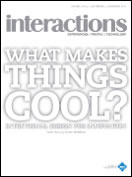Authors:
Frank Vetere, Martin Gibbs, Darren Edge, Stefan Agamanolis, Jennifer Sheridan, Daniel Leithinger, Dávid Lakatos, Anthony DeVincenzi, Matthew Blackshaw, Edwina Portocarrero, David Robert, Michelle Chung, Sean Follmer, Edwina Portocarrero, Ye Wang, Lina Johansson, Claes Ericson, David Karlsson
Jogging over a Distance is a support system for social joggers who live apart or have different abilities but who want to run "together." Headsets allow both conversation and sharing of breathlessness, with the audio sounding like it is coming from ahead, beside, and behind you as you catch up with, run alongside, and move past your partner. Rather than comparing running speeds to calculate who is in front, we compare each jogger's heart rate relative to their target, creating a motivational and equitable running experience in which joggers of different abilities can run together, even as far apart as Europe and Australia.

Project website: http://exertioninterfaces.com/cms/jogging-over-a-distance.html
Publication:
Mueller, F., Vetere, F., Gibbs, M.R., Edge, D., Agamanolis, S., and Sheridan, J.G. Jogging over a distance between Europe and Australia. UIST '10. Proc. of the 23rd Annual ACM Symposium on User Interface Software and Technology (New York, NY). ACM, New York, 2010.
 Authors
Authors
Florian "Floyd" Mueller | The University of Melbourne | Exertion Games Lab/RMIT | [email protected]
Frank Vetere | The University of Melbourne | [email protected]
Martin R. Gibbs | The University of Melbourne | [email protected]
Darren Edge | Microsoft Research Asia | [email protected]
Stefan Agamanolis | Akron Children's Hospital | [email protected]
Jennifer G. Sheridan | London Knowledge Lab | [email protected]
Recompose is a new system for manipulation of an actuated surface. By collectively utilizing the body as a tool for direct manipulation alongside gestural input for functional manipulation, we show how a user is afforded unprecedented control over an actuated surface. We describe a number of interaction techniques exploring the shared space of direct and gestural input, demonstrating how their combined use can greatly enhance creation and manipulation beyond unaided human capability.

Project website: http://kiwi.media.mit.edu/recompose
Publication:
Leithinger, D., Lakatos, D., DeVincenzi, A., Blackshaw, M., and Ishii, H. Direct and gestural interaction with relief: A 2.5D shape display. UIST 2011 (forthcoming).
Blackshaw, M., DeVincenzi, A., Lakatos, D., Leithinger, D. and Ishii, H. Recompose: Direct and gestural interaction with an actuated surface. CHI WIP 2011.
 Authors
Authors
Daniel Leithinger | MIT Media Lab | [email protected]
Dávid Lakatos | MIT Media Lab | [email protected]
Anthony DeVincenzi | MIT Media Lab | [email protected]
Matthew Blackshaw | MIT Media Lab | [email protected]
 The Never-Ending Drawing Machine (NEDM) and Calliope
The Never-Ending Drawing Machine (NEDM) and Calliope
The Never-Ending Drawing Machine (NEDM) and Calliope (shown) are networked platforms that allow asynchronous viewing and physical editing of shared media at a distance, using a paper sketchbook as the main interface.
The systems layer analog and digital material, mapping pre-created digital media and captured analog content and displaying it on a networked "creation-station." Allowing objects to be used as creative material, the systems promote personalized, contextualized co-creation, bridging collaborative cross-cultural and cross-generational gaps.

Project websites: http://nedm.media.mit.edu and http://calliope.media.mit.edu
Publication:
Portocarrero et al. The NeverEndingStorytellingMachine: A platform for creative collaboration using a sketchbook and everyday objects. Papercomp: 1st International Workshop on Paper Computing, Ubicomp 2010.
 Authors
Authors
NEDM:
Edwina Portocarrero | MIT Media Lab | [email protected]
David Robert | MIT Media Lab | [email protected]
Michelle Chung | MIT Media Lab | [email protected]
Sean Follmer | MIT Media Lab| [email protected]
CALLIOPE:
Edwina Portocarrero | MIT Media Lab | [email protected]
Ye Wang | MIT Media Lab | [email protected]
C the City explores new ways of presenting and interacting with visualized data. Maps in various forms, models, and visualizations of cities and geographic regions are fascinating. They make it possible for us to get an overview, to see and create connections. In C the City these tools are used in a playful way to engage people in the development and future of Norrköping, Sweden. C the City consists of a large LEGO model on which data is projected. Users can explore the data connected to the city by interacting with a touchscreen.

Project websites: http://www.visualiseringscenter.se/c-the-city/en/
 Authors
Authors
Lina Johansson | Citilab/Norrköping Visualisering AB | [email protected]
Claes Ericson | The Interactive Institute | [email protected]
David Karlsson | The Interactive Institute | [email protected]
©2011 ACM 1072-5220/11/11 $10.00
Permission to make digital or hard copies of all or part of this work for personal or classroom use is granted without fee provided that copies are not made or distributed for profit or commercial advantage and that copies bear this notice and the full citation on the first page. To copy otherwise, to republish, to post on servers or to redistribute to lists, requires prior specific permission and/or a fee.
The Digital Library is published by the Association for Computing Machinery. Copyright © 2011 ACM, Inc.







Post Comment
No Comments Found